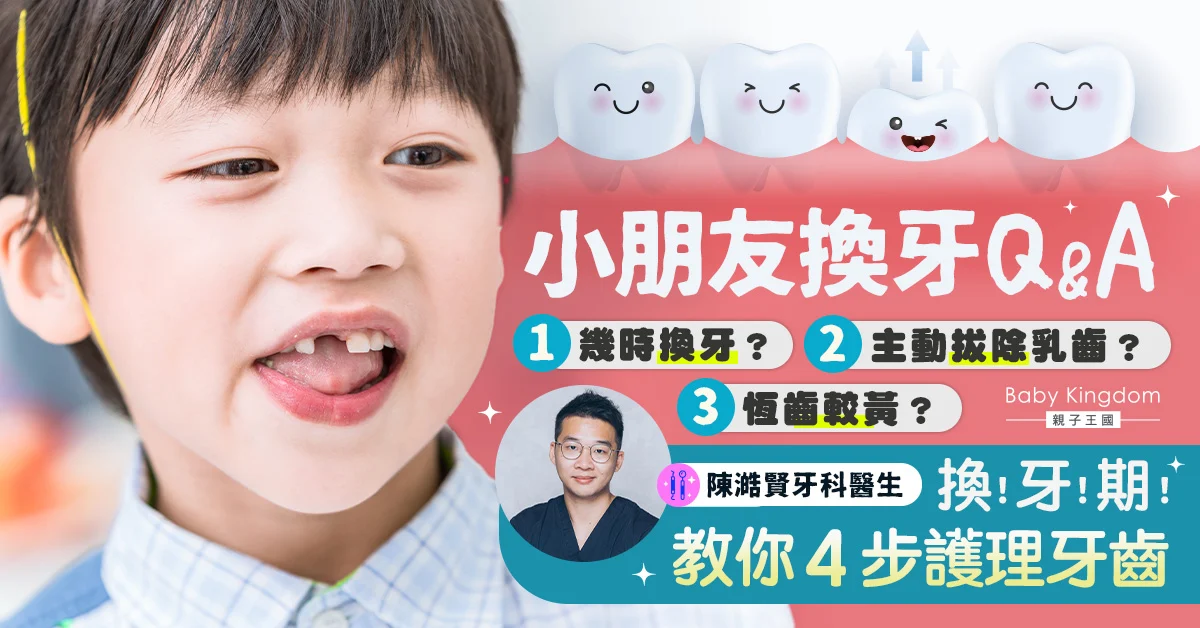[Teething Q&A] Parents are not afraid of the teething period and are protecting their children's permanent teeth growth!
The period of losing baby teeth and getting new ones is a crucial stage in many children's development, so parents are particularly anxious and attentive. When exactly does this period occur? Should baby teeth be extracted? And what precautions should be taken?
Is your child going through the teething period?
Around 5 to 6 years old, permanent teeth begin to replace baby teeth, marking the start of the dentition replacement period. Baby teeth become loose due to root shrinkage and fall out one after another, while permanent teeth erupt in their place. The general order of tooth replacement is from the front incisors, lateral incisors, canines, and then the back molars, although this order doesn't apply to everyone. The dentition replacement period lasts until around 12 to 13 years old, until 28 to 32 permanent teeth have erupted.
Should I have my baby teeth extracted?
Many parents worry that baby teeth will block the growth of permanent teeth, so they pull out their children's baby teeth as soon as they find them loose. However, according to the Department of Health's guidelines, forcibly removing baby teeth too early can lead to misaligned permanent teeth, so it is better to wait for the baby teeth to fall out on their own.
During the teething process, "overlapping teeth" may occur, where baby teeth don't fall out in time, but the permanent incisors in the lower jaw are already growing behind the baby teeth. Generally, this won't affect the growth of the permanent incisors, so there's no need to forcibly extract the baby teeth. When the baby teeth fall out naturally, the permanent teeth will usually grow into their normal positions.
Why do baby teeth fall out but permanent teeth still don't grow in?
Normally, permanent teeth will naturally erupt in the space within a few months, and it is considered normal for new teeth to erupt within an average of 6 months. The timing of tooth replacement varies from person to person, and even compared with other children of the same age, a difference of one year is considered normal.
In some cases, premature loss of baby teeth may be caused by cavities, allowing bacteria to travel through the root canal to the tooth root, causing inflammation of the surrounding alveolar bone and affecting the growth of the underlying permanent tooth germ. If this occurs, it is recommended that parents take their children to a pediatric dentist to understand the problem.
Do I need immediate orthodontic treatment if the gaps between my upper teeth are too large?
During the teething period, many children's upper central incisors grow outwards in a shape resembling the number "8", leaving a noticeable gap in the middle. This gap will naturally disappear as the canines on either side grow in, and the canines usually finish growing in between the ages of 11 and 13.
Why are permanent teeth more yellow?
Because permanent teeth have a higher degree of enamel calcification and translucency, light can bring out the yellow ivory beneath the enamel. Therefore, permanent teeth are generally "yellower" than deciduous teeth.
How should you care for your teeth during the period of tooth replacement?
1. Prevent tooth decay
Tooth decay is the most common oral health problem in young children. Many parents believe that baby teeth will eventually fall out, so they ignore the problem even if cavities occur. However, cavities in baby teeth must be treated actively to avoid affecting the permanent teeth that will follow. Children should also reduce their intake of sugary foods. In addition to brushing their teeth frequently and using dental floss, it is recommended to have fluoride varnish applied regularly or use fluoride toothpaste to increase the protective layer on their teeth.
2. Eat more chewy foods
Children should eat more chewy foods, such as konjac and beef, to stimulate gum development and help permanent teeth erupt more smoothly. At the same time, avoid giving children too many soft foods, as insufficient chewing can lead to narrowed gums and hinder the development of permanent teeth.
3. Avoid bad oral hygiene habits
Many children have bad oral habits such as sucking their fingers or swallowing saliva in the wrong way, which can cause an imbalance in oral muscles, potentially leading to tooth decay, or problems such as protruding upper teeth, narrow dental arch, and poor mandibular development, which can hinder the growth of permanent teeth.
4. Remember to replace your toothbrush regularly.
Research shows that new toothbrushes are far more effective at removing plaque than old toothbrushes that have been used for three months. Therefore, it is recommended that children's toothbrushes be replaced after three months of use or when they are worn out to ensure that newly erupted permanent teeth are well cared for.
Author: Dr. Eric Chan















